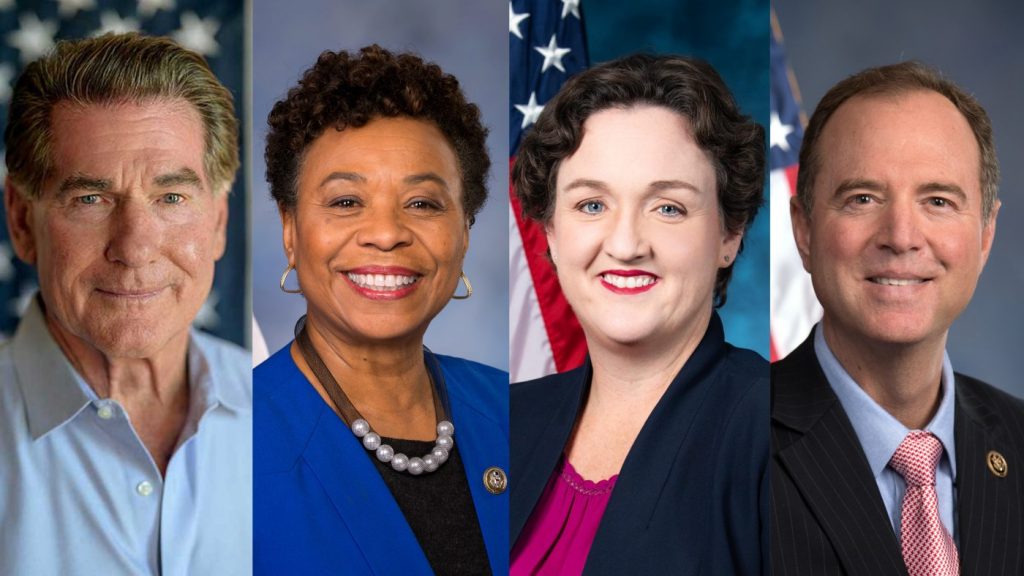With voting already underway, the leading candidates for California’s U.S. Senate seat will face off for a second time Monday night in San Francisco for what may well be the last chance to shake up the race before the March 5 primary election.
The leading candidates — Democratic Reps. Adam Schiff of Burbank, Katie Porter of Irvine and Barbara Lee of Oakland, and Republican former Los Angeles Dodgers and San Diego Padres first baseman Steve Garvey of Palm Desert — debated once before on Jan. 22 at the University of Southern California.
Recent polls, including one following the last debate, have consistently put Schiff in the lead, with Porter and Garvey neck and neck for second place and Lee not far behind. The two candidates with the most voters March 5, regardless of party, will compete for the seat in the November election.
RELATED: How California U.S. Senate candidates would differ from Feinstein and each other
“This is the first debate taking place in Northern California,” said political analyst Dan Schnur, who teaches at the University of Southern California and UC Berkeley. “Three of the four candidates on the stage are from Southern California and this is their first chance to be directly exposed to a Bay Area audience. Especially for Katie Porter and Barbara Lee, who are fighting to get into the runoff, this is an opportunity to appeal to a heavily Democratic audience.”
The 7 p.m. debate will be hosted by Nexstar Media Group‘s “Inside California Politics” and held in the KRON 4 News studio, moderated by program hosts Frank Buckley and Nikki Laurenzo. It will be broadcast statewide including on KRON 4 TV in the Bay Area. It also will be streamed live on kron4.com and on the KRON 4 app. It is expected to be the last debate before the primary.
The four candidates were chosen for the debate out of a crowded field, in part based on polling and fundraising indicating they are clearly in the lead as serious contenders.
The four are competing for the seat long held by late Democratic Sen. Dianne Feinstein, a former San Francisco mayor who died in September at age 90 after more than 30 years in the Senate. Her seat is presently occupied by Sen. Laphonza Butler, a Democrat appointed by Gov. Gavin Newsom after Feinstein’s death. Butler has declined to run for a full term.
California’s other U.S. Senator is Democrat Alex Padilla, the former secretary of state Newsom appointed after Sen. Kamala Harris became vice president. Padilla was elected to a full term in 2022 over Republican challenger Mark Meuser.
The Jan. 22 debate included some colorful lines, but polling indicates it did little to shake up the dynamics of the race.
Schiff “did what he needed to do to maintain his frontrunner status” with a “steady” performance that “hit all the right notes,” while Porter evidently “didn’t do enough” to move up and secure the runner-up spot, said Sonoma State University Political Science Professor David McCuan. Lee delivered a solid performance, but she hasn’t gained on her rivals in polls and fundraising and remains in jeopardy of a fourth-place finish.
Garvey, making his first bid for public office, looked very much like the rookie politician against the three more seasoned candidates who repeatedly piled onto him, McCuan said. But that doesn’t necessarily hurt his chances at a second-place primary finish if the Democrats split the vote while Garvey consolidates Republican voters.
With 47% of voters registered Democratic, 24% Republican and 22% with no political party, Schnur said while there aren’t nearly enough Republicans in California to elect a Senator without pulling in other voters, “there are just enough of them to get a candidate into second place.”
Related Articles
How California U.S. Senate candidates would differ from Feinstein and each other
Letters: Garvey’s popularity | Measures A and B
Q&A: Eight things you need to know about California’s weird voting rules for the March primary
“That’s a problem for Porter and Lee and an opportunity for Schiff,” Schnur said. “They need to tear Garvey down” to keep him from finishing second, while Schiff would face an easier November opponent in Garvey.
For Monday’s debate, the candidates “each have different set requirements,” McCuan said. For Schiff, “his goal is to elevate and remain the leader.”
Porter “has to muscle in, and has to not only go after Schiff, but move Garvey out,” McCuan said. “She needs more than a Schiff misstep, and more than a Garvey whiff.”
“Barbara Lee has to make a case to remain on stage, to remain in the race,” McCuan said.
And Garvey, he said, “will have to provide more steak and sizzle.”
“A mediocre performance by Steve Garvey can keep him over the Mendoza line” — baseball’s .200 batting average futility threshold — if Republicans continue to rally around the former slugger up to the primary, McCuan said. But he’ll need a bit more than that to put Porter away and clinch second place.
“He’s got to smack the ball hard,” McCuan said.
How to watch the debate:
The debate will air Monday, Feb. 12 at 7 p.m. on Nexstar California stations statewide and their digital platforms. In the Bay Area, it will be telecast on KRON 4 TV and also livestreamed on kron4.com and on the KRON 4 app.


